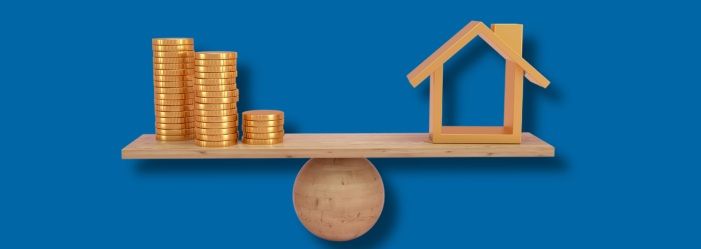Last Updated: November 09, 2023
Balancing Debt Management with Homeownership Dreams

Dreaming of owning your own home but worried about how to handle existing debts? You're not alone. Many people carry student loans, auto loans, credit card balances and other financial obligations that make them wonder if buying a house is feasible.
While having debt doesn't necessarily make you ineligible for a mortgage, it can impact your interest rate, loan amount, and eligibility if not managed carefully.
The good news is with strategic planning, you can pay down debts in a way that puts you in the best position to qualify for a home loan. However, becoming 100% debt-free is not always required or even advisable.
Steps to Take Before Buying a House
Before picking out your dream home or starter home, take key steps to get your finances in order:
- Build an emergency fund with 3-6 months' living expenses. Having this cushion will prevent you from racking up more debt if an unexpected expense comes up. Aim to have at least $5,000 set aside.
- Pay down high-interest credit card debts. Focus first on credit cards charging over 15% interest to save the most on interest fees. Get balances below 30% of the credit limit.
- Review your credit reports and scores. Look for any errors on your reports and dispute them. If your scores are low, take steps like paying down debts and keeping credit card balances low to improve it before applying for a mortgage. Aim for a credit score above 740.
- Use an online mortgage calculator to find your ideal monthly payment and price range. See how much house you can realistically afford based on your income, existing debts, and savings.
- Get pre-approved for a mortgage. Being pre-approved signals to sellers that you are a serious buyer and gives you a baseline for the maximum home price and mortgage amount you qualify for.
Now onto your main question — should you pay off debt before buying a house?
I never truly understood the saying “more money, more problems” until I actually started making more money. I’m not rich by any means, but every time I get a raise, a bonus, or a promotion, I go out and spend more money, which leads to more debt and more problems.
Most of us want to end our cycle of spending and become financially free. Unfortunately, increased spending with increasing earnings is just the start of our debt woes; it gets even more complicated when you start thinking about bigger, more necessary purchases.
If you’re anything like me, the more money you’ve made, the more you’ve thought about that one massive investment we all aspire to — a home of your own. A house is a more worthwhile purchase than most things, but the prospect can leave us wondering how to prioritize our debts.
Obviously, the fewer debts you have, the easier it will be to qualify for a mortgage loan, right? Not necessarily. Before picking out your dream home or starter home, you need to figure out which debts to eliminate and which to work on in the long run — a task which can be frustratingly complex.
Paying Off Debt Before Getting a Mortgage
So, here’s the big question: should you pay off debt before buying a house? The short answer is yes, by all means, you should pay off debt before buying a house. But, you absolutely must do it strategically.
And you probably shouldn’t close all credit card accounts, or you could ruin your chances of even qualifying for a mortgage. If you have no debts (credit card accounts or otherwise), you could ruin your Debt-to-Income ratio (DTI), which is what banks look at to determine your borrowing capacity.
Banks use your DTI in order to score your ability to handle a mortgage loan. DTI is calculated by dividing your total minimum debt by your gross monthly income. If you have two minimum monthly payments of $500 each and a monthly income of $3000, your DTI is 33 percent (1000 divided by 3000), which is a pretty good DTI.
According to Investopedia, “a low debt-to-income ratio demonstrates a good balance between debt and income. In general, the lower the percentage, the better the chance you will be able to get the loan or line of credit you want.” With DTIs, the lower the better. But, if you’re looking for a DTI ratio to shoot for, try to stay under 40 percent, with a max DTI being 43 percent.
Becoming Debt-Free While House Hunting
You probably already noticed that becoming completely debt-free might not be as simple as it sounds, especially when house hunting; you almost need to approach the matter sideways. Instead of just paying off all of your debts blindly, you should pay attention to what your debts do to your home-buying chances. Most people would pay off high-interest debts first, in order to save more money. However, one of the best things you can do to qualify for a great mortgage loan is to make big payments on big debts — which leads to a better mortgage.
You’d think it would be safest to pay off your high-interest debts first, but that doesn’t really help your chances with the bank. In reality, paying off debts with large payments does signal to the bank that you might be prepared for the responsibility of mortgage payments.
For example, if you have a $10,000 (15 percent interest) credit card bill and about $10,000 dollars to pay bills, paying a big chunk of your $15,000 (0 percent interest) debt will actually help you more than paying off your entire credit card bill.
So you can go ahead and pay off those high-interest debts if you want, but the banks aren’t highly interested in them. What’s really impressive to banks and mortgage companies is if you can pay off debts with big payments (regardless of interest). According to Fox Business, “banks and mortgage companies do factor in what you are obligated to pay each month as a benchmark for determining your credit capacity.”
When you think about approaching paying debts vs. buying a home, remember these two important facts: first, your credit score will affect your interest rate. Second, your income (minus your payments on current debts) will signal to banks how much money you can borrow. It might be a bit complicated at first, but if you stick with it, do enough research, and ask for advice from friends, you’ll be much more equipped to handle life’s financial challenges and enjoy its rewards.
FAQs
Conclusion
Deciding whether to pay down debts or save up for a home can be a complicated financial move. The right choice depends on your specific situation, debts, savings, credit, and more. While becoming completely debt-free may seem ideal before buying a house, it isn't always the most strategic approach.
When you think about approaching paying debts vs. buying a home, remember these two important facts: First, your credit score will affect your mortgage interest rate. Paying off credit card balances and maintaining on-time payments can help improve your score and qualify you for better loan terms.
Second, your income minus your payments on current debts will signal to banks how much they are willing to lend you. Keeping your debt-to-income ratio below 43% demonstrates you can manage a mortgage payment along with other monthly obligations.
It might be a bit complicated at first, but if you stick with it, do enough research, and ask for advice from financial professionals, you’ll be much more equipped to handle life’s financial challenges and enjoy its rewards. With strategic planning and preparation, you can put yourself in a strong position to achieve the dream of homeownership.
If you are struggling with overwhelming debt and want to explore your debt relief options, Pacific Debt Relief offers a
free consultation to assess your financial situation and debt-free. Our debt specialists can provide objective guidance relevant information and support to help find the right debt relief solution.
✔ Accredited by Better Business Bureau with BBB A+ rating (4.92 rating and 1,700+ reviews)
✔ 7.5 star rating by BestCompany.com (over 2300+ client reviews)
✔ 4.8 star rating by TrustPilot (over 2200+ verified consumer reviews)
✔ ConsumerAffairs.com Accredited (over 500+ verified reviews with an average rating of 5 stars)
✔ A Top 10 Rated Compan by TopTenReviews.com , ConsumersAdvocate.com and Top10debtconsolidation.com
✔ 4.6 star rating by Google (400+ client reviews)
✔ 100% rating by SuperMoney (8 client reviews)
Reduce Your Credit Card Debt By Up to Half

BBB Reviews | 4.9/5.0 Rating









 Do Not Sell My Personal Information
Do Not Sell My Personal Information